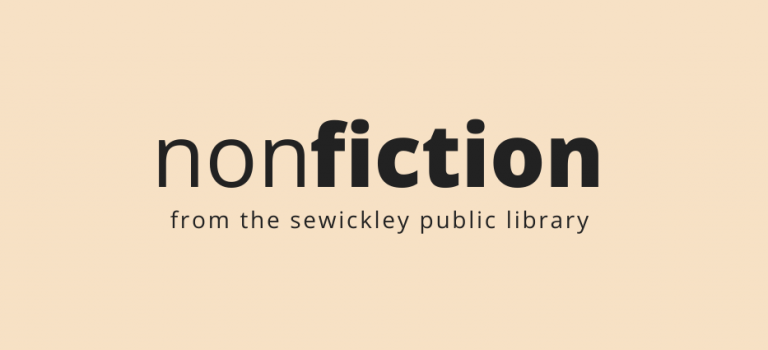Longing to learn while you read? Get your history lesson with these notable non-fiction titles.
Parisian Lives: Samuel Beckett, Simone de Beauvoir and Me by Deidre Bair
In 1971 Deirdre Bair was a journalist and a recently minted Ph.D. who managed to secure access to Nobel Prize-winning author Samuel Beckett. He agreed that she could be his biographer despite her never having written a biography before. The next seven years of probing conversations, intercontinental research, singular encounters with Beckett’s friends, and peculiar cat-and-mouse games resulted in Samuel Beckett: A Biography, which went on to win the National Book Award and propel Bair to her next subject: Simone de Beauvoir.
From Russia with Blood by Heidi Blake
They thought they had found a safe haven in the green hills of England. They were wrong. One by one, the Russian oligarchs, dissidents, and gangsters who fled to Britain after Vladimir Putin came to power dropped dead in strange or suspicious circumstances. One by one, their British lawyers and fixers met similarly grisly ends. Yet, one by one, the British authorities shut down every investigation — and carried on courting the Kremlin.
Give Me Liberty by Richard Brookhiser
Award-winning historian and biographer Richard Brookhiser offers up a truer and more inspiring story of American nationalism as it has evolved over four hundred years. He examines America’s history through thirteen documents that made the United States a new country in a new world: a free country. We are what we are because of them; we stay true to what we are by staying true to them.
The Anarchy by William Dalrymple
In August 1765, the East India Company defeated the young Mughal emperor and set up, in his place, a government run by English traders who collected taxes through means of a private army. The creation of this new government marked the moment that the East India Company ceased to be a conventional company and became something much more unusual: an international corporation transformed into an aggressive colonial power.
The Shadow of Vesuvius: a Life of Pliny by Daisy Dunn
When Pliny the Elder perished at Stabiae during the eruption of Vesuvius in 79 AD, he left behind an enormous compendium of knowledge, his thirty-seven-volume Natural History, and a teenaged nephew who revered him as a father. Grieving his loss, Pliny the Younger inherited the Elder’s notebooks―filled with pearls of wisdom―and his legacy.
Wounded Shepherd by Austin Ivereigh
This deeply contextual biography centers on the tensions generated by the pope’s attempt to turn the Church away from power and tradition and outwards to engage humanity with God’s mercy. Through battles with corrupt bankers and worldly cardinals, in turbulent meetings and on global trips, history’s first Latin-American pope has attempted to reshape the Church to evangelize the contemporary age. At the same time, he has stirred other leaders’ deep-seated fear that the Church is capitulating to modernity―leaders who have challenged his bid to create a more welcoming, attentive institution.
Sam Houston and the Alamo Avengers by Brian Kilmeade
In March 1836, the Mexican army led by General Santa Anna massacred more than two hundred Texians who had been trapped in the Alamo. After thirteen days of fighting, American legends Jim Bowie and Davey Crockett died there, along with other Americans who had moved to Texas looking for a fresh start. It was a crushing blow to Texas’s fight for freedom. But the story doesn’t end there. The defeat galvanized the Texian settlers, and under General Sam Houston’s leadership they rallied. Six weeks after the Alamo, Houston and his band of settlers defeated Santa Anna’s army in a shocking victory, winning the independence for which so many had died.
Blowout by Rachel Maddow
In 2010, the words “earthquake swarm” entered the lexicon in Oklahoma. That same year, a trove of Michael Jackson memorabilia—including his iconic crystal-encrusted white glove—was sold at auction for over $1 million to a guy who was, officially, just the lowly forestry minister of the tiny nation of Equatorial Guinea. And in 2014, Ukrainian revolutionaries raided the palace of their ousted president and found a zoo of peacocks, gilded toilets, and a floating restaurant modeled after a Spanish galleon. Unlikely as it might seem, there is a thread connecting these events.
Peace, War and Liberty by Christopher A. Preble
Has the United States been a force for liberty around the world? Should it be? And if so, how? To answer these questions, Christopher A. Preble traces the history of U.S. foreign policy from the American Founding to the present, examining the ideas that have animated it, asking whether America’s policy choices have made the world safer and freer, and considering the impact of those choices on freedom at home.
Betrayal in Berlin by Steve Vogel
Its code name was “Operation Gold,” a wildly audacious CIA plan to construct a clandestine tunnel into East Berlin to tap into critical KGB and Soviet military telecommunication lines. The tunnel, crossing the border between the American and Soviet sectors, would have to be 1,500 feet (the length of the Empire State Building) with state-of-the-art equipment, built and operated literally under the feet of their Cold War adversaries. Success would provide the CIA and the British Secret Intelligence Service access to a vast treasure of intelligence. Exposure might spark a dangerous confrontation with the Soviets. Yet as the Allies were burrowing into the German soil, a traitor, code-named Agent Diamond by his Soviet handlers, was burrowing into the operation itself. . .
